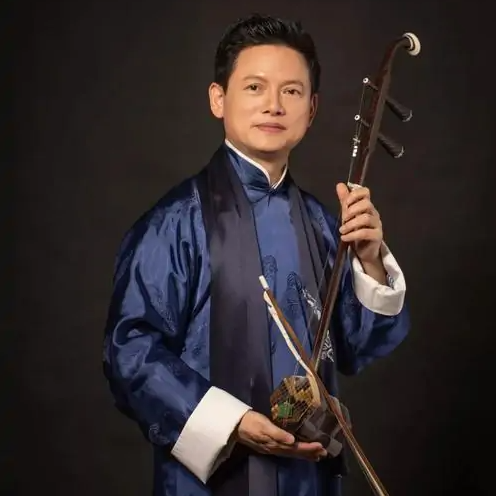Deng Jiandong
 Deng Jiandong, born in Wuxi, Jiangsu, is a Chinese erhu player and a national first-class player of the Kongzheng Art Troupe.
Deng Jiandong, born in Wuxi, Jiangsu, is a Chinese erhu player and a national first-class player of the Kongzheng Art Troupe.In 1985, he won the second prize in the youth group of the first youth erhu competition in Jiangsu Province; in the same year, his debut work "Chunxiao in Gusu" won the Outstanding New Work Award; in the same year, he participated in the first Beijing Erhu Invitational Competition in China and won the first prize.
In 1986, he studied in the Music Department of Nanjing University of the Arts without examination, under the tutelage of Professor Ma Youde.
In 1989, after graduating, he was specially recruited by the Kongzheng Cultural and Art Troupe.
In 1994, the erhu pieces "Gusu Chunxiao" and "Wu Ge" won the first and second prizes for solo works at the 3rd National National Orchestra Exhibition, respectively, and won the Outstanding Performance Award.
In 2001, he held an erhu solo concert in Wuxi with conductor and composer Liu Wenjin.
In 2003, he served as the judge of the 3rd Chinese Music "Golden Bell Award" National Erhu Competition. In 2006, his "Prairie Charm" (cooperation) won the first prize in the New Work Competition of the 2nd International Huqin Art Festival.
In January 2008, in cooperation with conductor Peng Jiapeng and the Czech National Symphony Orchestra, he held an erhu solo concert at the Vienna Golden Hall.
In 2009, he served as the judge of the 7th Chinese Music "Golden Bell Award" National Erhu Competition; in the same year, he served as the judge of the CCTV National Instrumental Music Competition.
In 2010, a special concert of "Xiange Xing" was held at the Shanghai Concert Hall; in August, a concert was held at the National Grand Theater to celebrate the 60th anniversary of the establishment of the Kongzheng Cultural and Art Troupe.
In 2012, he participated in the "Glorious Blooming Ten Young Erhu Performers Concert" by CCTV Music Channel. In 2013, he participated in the "Folk Music Masters" gathering concert in Taiwan, China.
In 2015, he performed with conductor Juanjo Mena and the British BBC Philharmonic Orchestra.
In 2019, the first release ceremony and signing ceremony of "Deng Jiandong's Erhu Performance Classic Album" and "Deng Jiandong's Erhu Performance Art Collection" was held in Shanghai recently.
In 2020, Deng Jiandong will be the artistic director of the Wuxi Chinese Orchestra.
Similar artist
Involving musical instruments
Involved portfolio
Involved news
Popular artists
- 01 Zhang Xiuyan
- 02 Chen Tao
- 03 Li Muliang
- 04 Zhu Changyao
- 05 Zhang Gaoxiang
 渝公网安备 50010702504639号
渝公网安备 50010702504639号